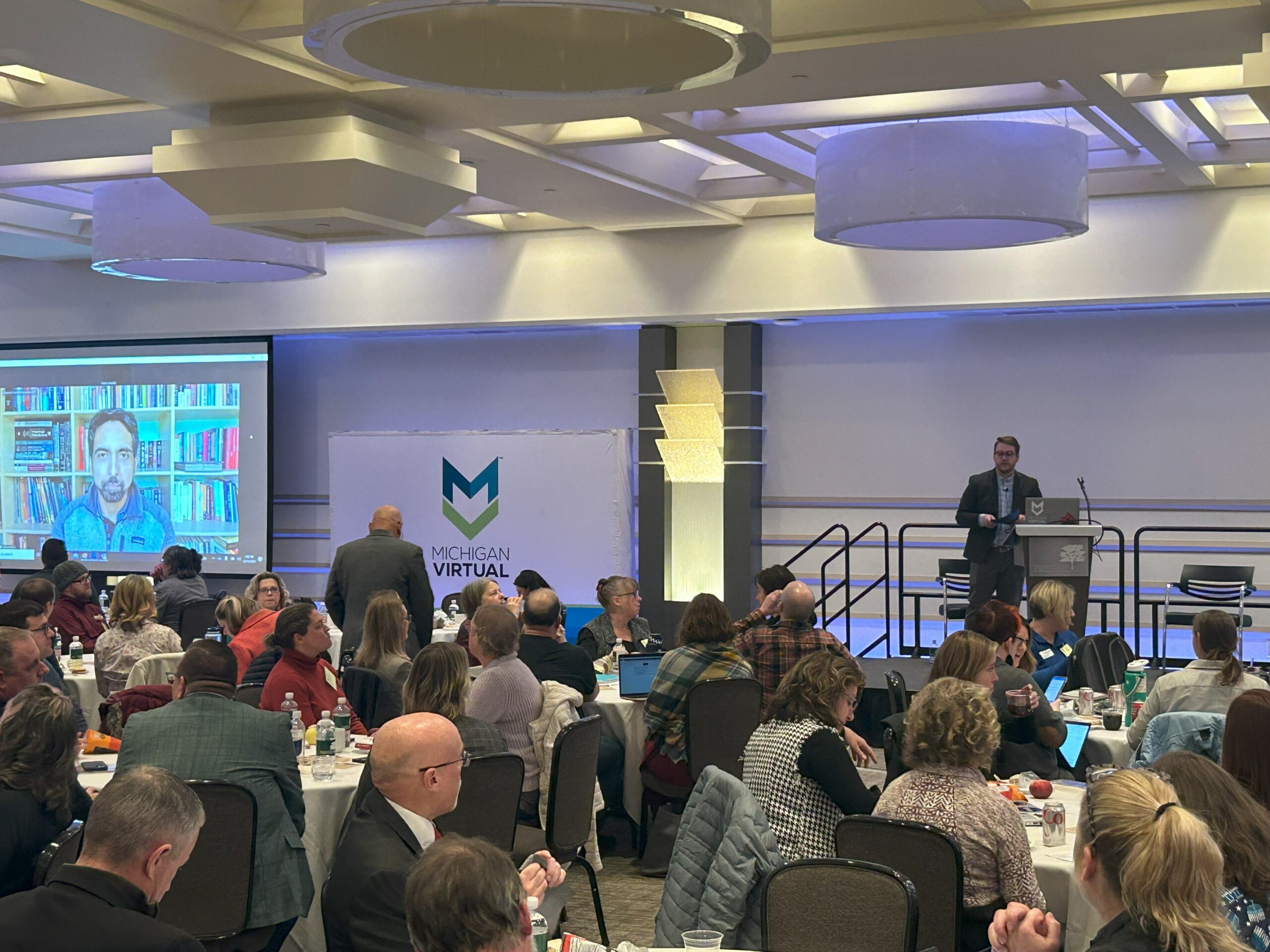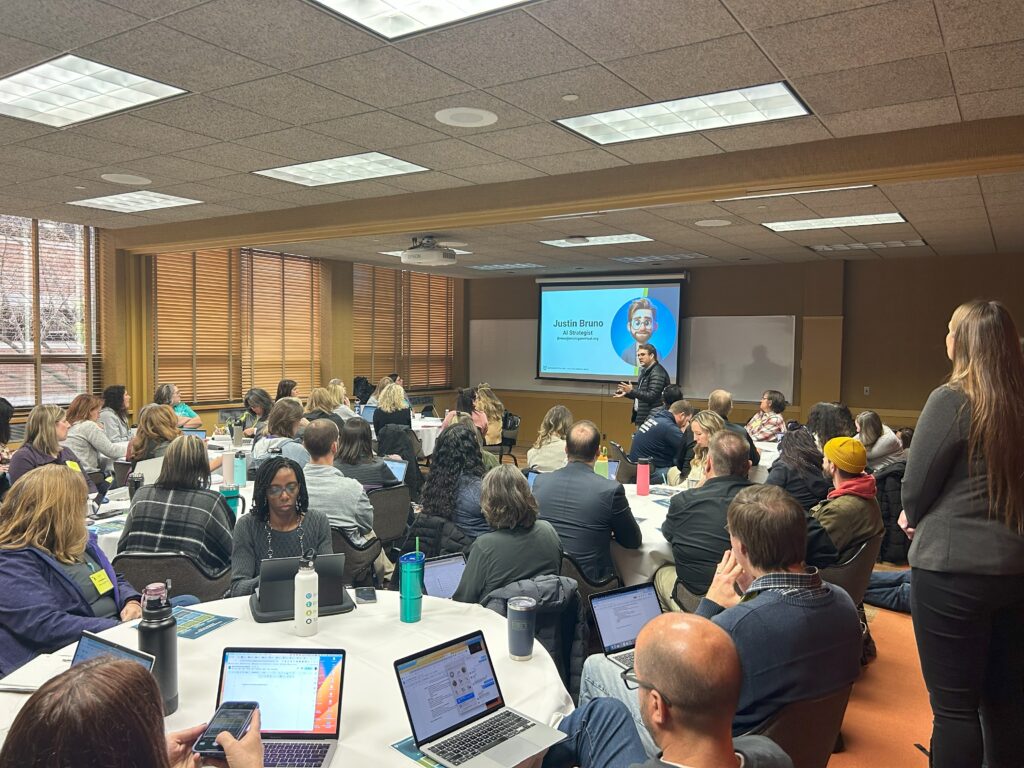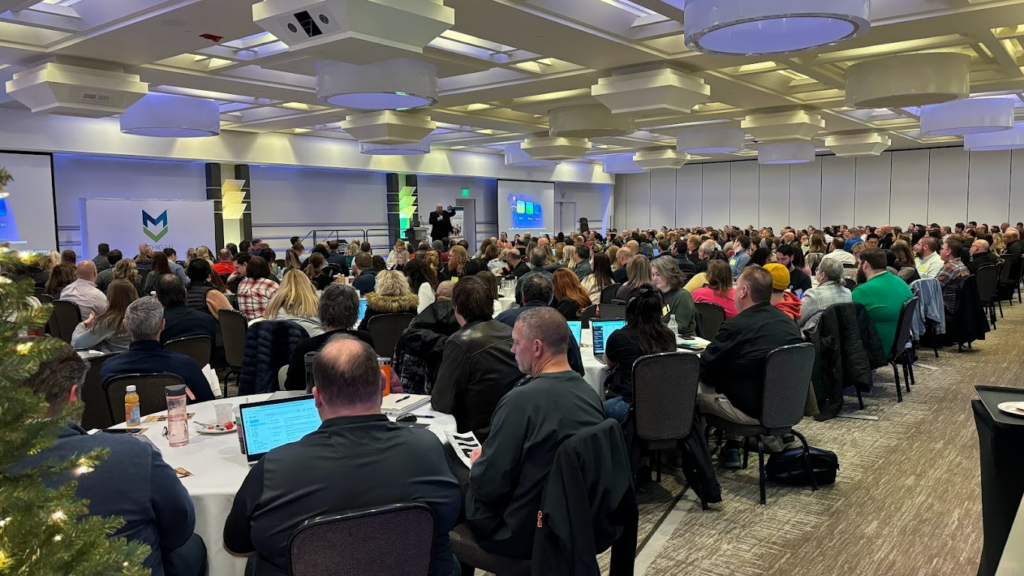The topic of AI is one of the most discussed in education in recent memory, so perhaps it’s no surprise that the 2023 AI Summit, hosted by Michigan Virtual and MACUL on the campus of Michigan State University, was at a sold out capacity. Attendees included teachers, technology coaches and directors, building and central administrators, and other leaders from across Michigan trying to stay up to date on this rapidly advancing field and develop positive approaches to AI implementation in their own settings.
The Edge of Innovation: Dan Fitzpatrick’s Opening
The day started with an anchor presentation from Dan Fitzpatrick, aka the AI Educator, who informed us he’d been tasked with taking us to “the edge of the cliff”, then bringing us back to reflect. He gave examples of some of the impressive capabilities of AI tools currently on the market, as well as ones that seemed from a sci-fi future, and asked us to predict the unpredictable: what sorts of disruptions might education and society face as machines become more and more capable? In order to prepare for such a future, he argued, educators need to move from “Box 1” innovations, tweaking for efficiency at the margins, to “Box 3” thinking: totally overhauling the purpose and processes that underpin system itself. His message was met with a lot of enthusiasm from the attendees who seemed acutely aware of the need for change in such a rapidly shifting technology landscape.
Human-Centric Innovation: Dr. Sabba Quidwai’s Vision for Education
The second anchor presentation came from Dr. Sabba Quidwai, a former education executive at Apple who now works with schools to bring a learner-centered design approach that serves students holistically and harnesses the power of technology to help them achieve their goals. She noted that her work has always incorporated the elements of design thinking, which has become even more important as AI technologies have improved, because design thinking keeps the focus on the human experience and determining how best to improve it, not centering the technology itself. Her message definitely resonated with attendees who were excited about the benefits that AI technology might bring but understand the real, enduring value that humans bring to the processes of teaching and learning.
Revolutionizing Education: Sal Khan's Insights on AI-Personalized Learning

Our third anchor presentation was a “fireside chat” with Sal Khan, founder of Khan Academy, about how he and his organization are embracing AI to personalize learning. I was grateful to be able facilitate such a rich discussion with him about both the positive impacts they’re seeing in piloting their Khanmigo chatbot tool, as well as the challenges they’ve faced that led them to build more supports and features to help teachers and students. We even hypothesized about what technology might afford us in 5 or 10 years, where AI tools might be able to create very personalized learning experiences by generating all new videos or other content for students in a matter of seconds. He was also transparent about the need for resources to develop and implement these systems in ways that don’t widen the access gap and for strategies to avoid inequitable access.
Dr. Punya Mishra’s Journey and the “Possibility Engine” of AI in Education
Our last anchor session of the day was delivered by Dr. Punya Mishra, Associate Dean of Scholarship & Innovation and Professor at Arizona State University. Dr. Mishra’s session was a personal reflection on technology’s major impact on his own life and an exploration of how technology had allowed him to see the “adjacent possible” opportunities to create, design, and build a life of his own that aligned to his interests and passions. He suggests that we can think of AI as a “possibility engine” that can help us to reimagine education in new ways while being mindful of the need for human educators to create learning experiences that aren’t formulaic or predictable.
Empowering Change: Breakout Sessions and Collaborative Action

In addition to our anchor sessions, we had a variety of breakout sessions that went deeper into topics including classroom and assessment practices, discussions on ethics, and practical strategies for school and district administrators begin the process of intentional AI integration in their own schools. There was also a block of time dedicated for attendees to gather in regional PLNs based on their geographic location and dive into what actionable next steps might look like where they work. Overall, the day was characterized by cautious optimism, real excitement for change in our education practices, and a sense of urgency to act quickly in order to keep up with the rapid pace of technological breakthroughs. We at Michigan Virtual are honored to be able to facilitate these discussion and help educators where possible as we all navigate the future together.

